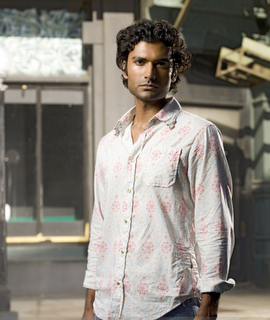I'm still planning that post about Hot Tubs. Indeed, I have to confess: I'm now planning a whole
series of hot tub posts - certain to bore every reader and potential reader out there. But that process cannot begin until there is some literal closure. (And, yes, that
is the correct use of literal.)
Thus, I thought I'd say a few words about the Richard Powers book that I recently finished reading. The book,
Prisoner's Dilemma, is not Powers' most recent novel. That title goes to
The Echo Maker, so kindly gifted to us by Rebecca's mom - and heroically delivered to us by Mike. I won't read that book for a while, not because I'm not eager to do so, but because I'm just enough of an ascetic to intentionally self-ration my consumption of sentences written by the man. My little history of reading Powers runs like this:
Galatea 2.2
Freely available in the sabbatical home fiction (and cookbook) library where we lived in State College, and then recommended to us by Joely. I read it, and liked it a lot - thought it an amazing combination of compelling plot, with genuine philosophical insight, and some nice techy stuff thrown in as a bonus. Some passages and sentences were mind-blowing, so I knew the guy had great talent. Still, I wouldn't call it one of the best books I ever read.
The Time of Our Singing
Imagine my surprise, then, when I bought the only Powers book available at the State College Barnes and Noble (or was it Borders, who can even tell the difference). The book looked long, and I was planning to fly from State College to London, so I figured it was good value for the money. I spent most of January, while Rebecca was away in India, reading it. It's the only book that, when I finished the last of almost 700 pages, I immediately and instinctively (without considering what I was doing) turned back to the beginning and reread the first chapter. It's also the only book I ever read over which I cried repeatedly. About a week or two after finishing it, I came to the inevitable conclusion that it was the best book I had ever read.
When Rebecca returned from India, I told her nothing about my perspective on the book; I simply handed it to her and said 'you must read this'. I said nothing to her while she read it, or when she was finished. About a week or so after her finishing, I asked what she thought of it. Her response: 'I think it's the best book I've ever read'.
Thus began our further journey through Powers Land, aided by finding most of his older novels used at Powell's later that summer.
The Gold Bug Variations
This is written on the same grand scale as the above book. It's massive, it's phenomenal, and it's an incredible feat. But it just doesn't quite pull it off. It's a fabulous book, but it misses the mark of genius. (Oh, and it finally made me understand - I think - something about DNA.)
Operation Wandering Soul
This is
, by far I'd say, Powers' darkest novel, and it's not like he's normally all about light joyous gaiety. Everything artistic in ER was stolen from this book. It gives this incredible picture of the 80's - it's even funny in a way - and it has some of the best-written passages of any of his works. Still, it's a bit too depressing for my tastes. (And as you'll see below, I don't have a hypersensitivy to depressing works.)
Gain
This
book centres on a protagonist dying of cancer and going through chemo; still, it's much lighter than the previous book. And it's totally gripping; and it's hopeful in its own way; and it 'gets' small-town America in the most amazing way. Brilliant book, probably tied for third on top Powers list.
Plowing the Dark
Virtual Reality, historical events, and a love story - what more could one want. A lot like
Galatea, but deeper and richer and more intoxicating. Tied for third.
That brings me to the book I just finished, but I've about run out of steam.
Prisoner's Dilemma is, above all, a story about family. It manages to tell that story while also talking, literally, about the Prisoner's Dilemma. It's also about hope and imagination, and even though this book too is about death, it's one of his most optimistic works. This text started off slowly for me, but it 'pulled it all together' - and this is the magic trick that Powers is always trying to pull off - so captivatingly and compellingly in the end, that it really took my breath away. It's his best short novel by far, I think, and his second best work overall.
I'd tell you to read it, of course, but it's rather obvious, isn't it, that I'm telling you to read them all.



